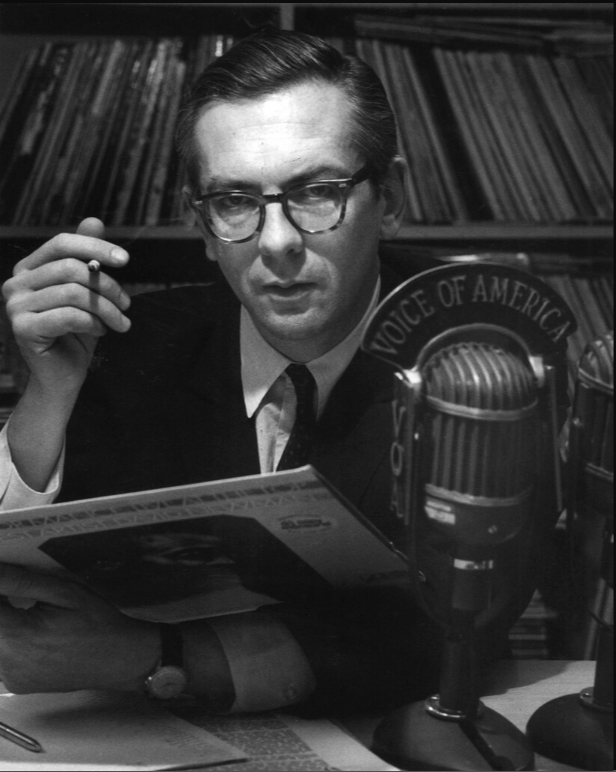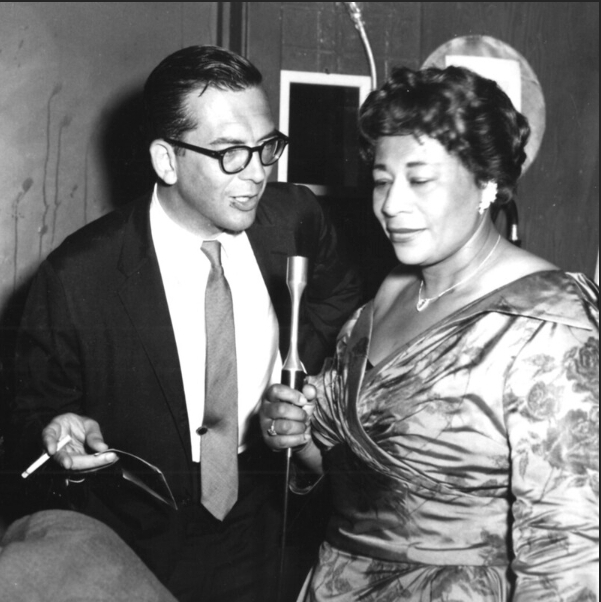Just a few weeks before his death at age 75, Willis Conover had still been doing what he had done for more than four decades—spreading the ideology of jazz six nights a week through his Music USA radio programs on the Voice of America.
Conover was a name beloved by music lovers across the globe though almost unknown in America, outside of the jazz community, despite working in Washington, DC, for over forty years, where he served as jazz producer and broadcaster on the Voice of America (VOA). Six days a week, his two-hour program Music USA was beamed on shortwave radio throughout the world except, by law, to the USA. The second hour of that program, Jazz USA, brought him international fame. It was a lifeline for jazz enthusiasts worldwide with a loyal radio audience estimated at 100 million people.
As a teen-ager growing up in Ireland, I discovered his wonderful program which brought to life the outstanding greats of jazz. Later as a G.I. in Germany I tuned in regularly. Today, living in Israel, I am exposed to a plethora of musicians who emigrated from behind the Iron Curtain. Without hesitation every one of them acknowledges Willis Conover as the prime influence in their choosing to become a jazz musician.

His voice, arguably the most recognizable overseas of any American of his era, carried the soulful notes of jazz across borders six nights a week. Though aimed primarily to pierce the Iron Curtain, it reached across the globe through the miracle of shortwave radio. His familiar “A Train” theme rolled over the airwaves as millions would fine tune their radio dials knowing what was coming next: a sugary, slow-talking baritone announcing, “This is Willis Conover in Washington, D.C., with the Voice of America Jazz Hour.” His deliberate, slow-paced delivery, coupled with scripts written in “special English” made his broadcasts accessible to varied audiences. Someone called him “the first English teacher to an entire generation of East Europeans.”
During the Cold War, when political tensions divided nations, Conover exercised his microphone as a diplomatic instrument. His nightly broadcasts kept the flame of jazz alive in the countries of Eastern Europe. Through the magic of music, he transcended borders and ideologies, connecting people who might otherwise never have shared a common language. Quoting the Washington Post “He outlasted eight administrations—Eisenhower was president on Jan. 6, 1955, when Conover made the first of more than 20,000 broadcasts. In the long run, he proved to be perhaps the most effective of all ambassadors—a goodwill emissary who turned the world on to jazz, which he considered America’s greatest contribution to the music of the 20th century.”
He joined the Voice of America (VOA) in 1955. At the height of his career, Conover was producing 17 different shows per week, including Music USA, Jazz Music USA, Standards, Music with Friends, and Willis Conover’s House of Sounds for VOA. These programs included hundreds of interviews, with popular Jazz artists including Duke Ellington, Ella Fitzgerald, Billie Holliday, Louis Armstrong, Dizzy Gillespie, and many more. John Birchard, who was the senior news broadcaster in the English language division wrote “he remains the single most important broadcaster in the 65 years VOA has been on the air.”

Born on December 18, 1920, in Buffalo, New York, his life was destined to shape the cultural landscape and bridge continents. His first gig as a radio announcer came while he was studying at Maryland State Teachers College at Salisbury, Maryland. A short time later he won an amateur contest that led to a job as radio announcer for WTBO in Cumberland, MD. It was there, as the story goes, he heard a recording of Charlie Barnet’s “Cherokee” and was so enchanted that he went to a record store looking for similar music. The store owner, seeing his selections, said, “You really like that jazz, don’t you?” to which Conover replied, “What’s jazz?” That first record he bought was to grow into a collection of over 60,000 discs.
On being drafted in 1942 and assigned to Fort Meade in DC. Conover took a part-time job as a deejay on WWDC where he included jazz in his programming, especially the Duke Ellington hour on Saturday nights. His guests on this program and his Saturday morning shows included many jazz artists.
Conover’s influence extended beyond the airwaves. He produced many jazz concerts in DC including at the White House as well as for movies and television. By arranging concerts where people of all races were welcome, he played a pivotal role in desegregating Washington, DC, nightclubs.

In 1956 Conover recorded a series of interviews with jazz luminaries Duke Ellington, Billie Holiday, Stan Getz, Peggy Lee, Stan Kenton, Benny Goodman, and Art Tatum. This latter interview with Tatum is reputedly “the only known in-depth recorded interview with the pianist.” In 2010, the Library of Congress added these recordings to the National Recording Registry, as part of their annual selection of “culturally, historically, or aesthetically significant” recordings.
On June 6.1987, Conover presided over one of the most incredible gatherings in jazz history as 65 musicians joined to pay tribute to Dizzy Gillespie on his 70th birthday at Wolf Trap Park in the Washington, DC, suburbs. I still have the program for that fabulous evening. It lasted over five hours. Happily, most of it can be seen in two parts on YouTube. “Probably one of the greatest live recorded jazz concerts,” was one comment. I totally agree. (If looking for a link enter “Dizzy Gillespie’s 70th Birthday1” exactly with no space. There are several partial copies.)
For over 15 years, Conover was the announcer for the Newport Jazz Festival. He also served as chairman of the jazz panel for the National Endowment for the Arts.
On a personal note, as I researched him for this article, I realized that one of the most important influences of my jazz life had literally been a neighbor for about 23 years without my knowing. However, I did have the privilege of being able to express my personal thanks when I met him in Washington, DC, in 1986 at an evening affair for a visiting Leningrad jazz band.
Following his death there were many efforts to recognize his contributions. Saturday, April 25, 2009, was designated ’Willis Conover Day’ by Congress to honor the Voice of America and Willis Conover for their joint contribution toward spreading the language of jazz and American cultural diplomacy around the world over a span of more than 35 years. “People used to say that Willis Conover single-handedly felled the Iron Curtain,” said Harry Schnipper, founder and owner of Blues Alley in DC who was a key figure in bringing about this recognition,
In the fall of 2007, in Washington, DC, a concert honoring Conover’s memory was held. All the players in the concert had developed as jazz musicians behind the iron curtain as a direct result of listening to Conover’s VOA programs. They were Paquito D’Rivera, (Cuba); Valery Ponomarev, (Soviet Union); Milcho Leviev, (Bulgaria); George Mraz, (Czechoslovakia); and Horacio Hernandez, (Cuba). This gathering of world-class artists inspired by Conover to become jazz musicians, expresses powerfully his contribution to US cultural diplomacy. Even to this day musicians worldwide credit Conover. In 2011, responding to the question “How did you become familiar with American jazz in South Africa in the 1950s?” Abdullah Ibrahim (also known as Dollar Brand) said “We listened to Voice of America jazz programs hosted by Willis Conover.”
Another interesting piece of unknown jazz history that came to light when researching this article was Conover’s involvement in cutting two 16-inch transcriptions for Thomas “Fats” Waller that have never been published. Charles Ray Sine, former chief engineer at WTBO relates “Mr. Conover assisted me making the arrangements for Mr. Waller to record. They were audition disks sent to RCA showing the ability of “Fats” to play classical music. Unfortunately, RCA would not agree for fear that it would hurt his jazz image. The world missed hearing some of the best classical piano I ever heard.”
Despite his being unknown to most Americans, there is a wealth of research in academic circles about Willis Conover. One such is Sounds For Adventurous Listeners: Willis Conover, The Voice of America, and The International Reception of Avant-Garde Jazz In The 1960s. Mark A. Breckenridge, B.M., M.M., M.M.E. Dissertation Prepared for the Degree of Doctor of Philosophy, University of North Texas, August 2012.

There are several excellent YouTube videos featuring Conover at work. What I found most interesting is that the myriad comments were almost all from viewers outside the USA. They all attest in one way or another to the incredible influence this man had around the world.
However, one of the most interesting was from an American that tells it all: “My high school class took a tour of the Voice of America back in the mid-’60s. At the end of the tour, the guide asked us who did we think is the most popular person in the Soviet Union. Some people said Yuri Gargarin, others said Nikita Khrushchev. The guide said no, it’s Willis Conover. He went on to say that the most popular gift you could give to a Soviet citizen was a portable tape recorder so they could record the Willis Conover show on the Voice of America.”
In conclusion, this most telling comment, from an unknown source, sums up the story of Willis Conover: “His legacy lives on, reminding us that sometimes, the most influential figures remain hidden in plain sight.”
Frank Farbenbloom is a traditional jazz supporter based in Israel.






















